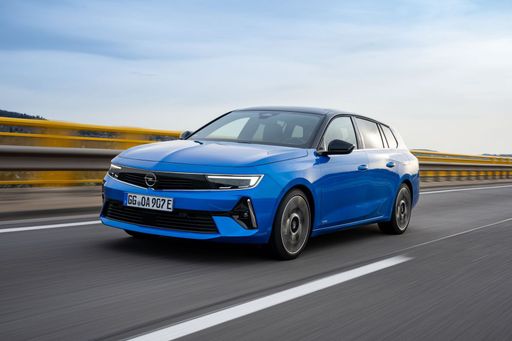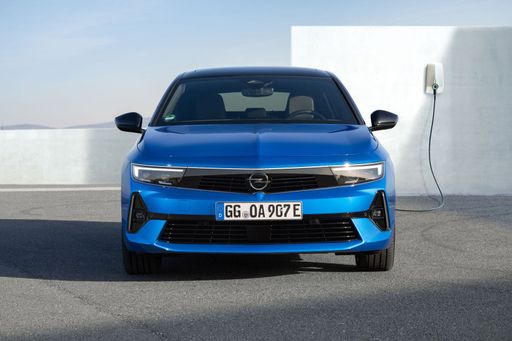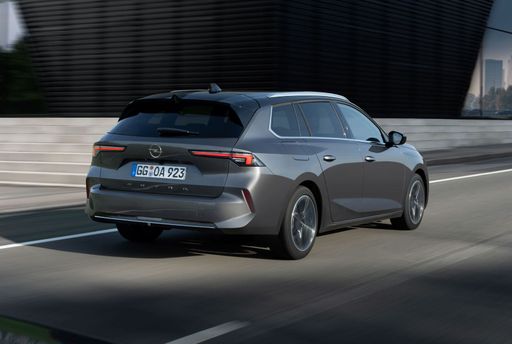Vauxhall Astra Sports Tourer vs Toyota Yaris – Which model is better for everyday use?
Two cars, one duel: Vauxhall Astra Sports Tourer meets Toyota Yaris.
Which one wins in performance, efficiency and value for money? Find out now!
Costs and Efficiency:
Looking at overall running costs, both models reveal some interesting differences in everyday economy.
Toyota Yaris has a clearly perceptible advantage in terms of price – it starts at 21900 £, while the Vauxhall Astra Sports Tourer costs 26500 £. That’s a price difference of around 4620 £.
Fuel consumption also shows a difference: Vauxhall Astra Sports Tourer manages with 2.30 L and is therefore clearly more efficient than the Toyota Yaris with 3.80 L. The difference is about 1.50 L per 100 km.
Engine and Performance:
Power, torque and acceleration say a lot about how a car feels on the road. This is where you see which model delivers more driving dynamics.
When it comes to engine power, the Toyota Yaris has a slightly edge – offering 280 HP compared to 225 HP. That’s roughly 55 HP more horsepower.
In acceleration from 0 to 100 km/h, the Toyota Yaris is noticeable quicker – completing the sprint in 5.50 s, while the Vauxhall Astra Sports Tourer takes 7.60 s. That’s about 2.10 s faster.
In terms of top speed, the Vauxhall Astra Sports Tourer performs hardly perceptible better – reaching 235 km/h, while the Toyota Yaris tops out at 230 km/h. The difference is around 5 km/h.
There’s also a difference in torque: Toyota Yaris pulls hardly perceptible stronger with 390 Nm compared to 360 Nm. That’s about 30 Nm difference.
Space and Everyday Use:
Cabin size, boot volume and payload all play a role in everyday practicality. Here, comfort and flexibility make the difference.
Both vehicles offer seating for 5 people.
In curb weight, Toyota Yaris is distinct lighter – 1090 kg compared to 1394 kg. The difference is around 304 kg.
In terms of boot space, the Vauxhall Astra Sports Tourer offers clearly more room – 597 L compared to 286 L. That’s a difference of about 311 L.
In maximum load capacity, the Vauxhall Astra Sports Tourer performs decisively better – up to 1634 L, which is about 699 L more than the Toyota Yaris.
When it comes to payload, Toyota Yaris hardly perceptible takes the win – 525 kg compared to 497 kg. That’s a difference of about 28 kg.
Who comes out on top?
Overall, the Vauxhall Astra Sports Tourer shows itself to be wins solidly and secures the title of DriveDuel Champion.
It convinces with the more balanced overall package and proves to be the more versatile choice for everyday use.

Vauxhall Astra Sports Tourer
Vauxhall Astra Sports Tourer
The Opel Astra Sports Tourer is a stylish and practical estate car that offers a versatile blend of comfort and functionality. With its sleek design and spacious boot, it caters perfectly to families and those with an active lifestyle. The interior is thoughtfully designed, providing both driver and passengers with a comfortable and technologically enhanced experience.
details @ media.stellantis.com
@ media.stellantis.com
 @ media.stellantis.com
@ media.stellantis.com
 @ media.stellantis.com
@ media.stellantis.com
Toyota Yaris
The Toyota Yaris exudes a charming blend of practicality and style, making it an appealing choice for urban drivers. Its compact design allows for easy manoeuvrability in crowded city streets, while the interior offers a surprisingly spacious and comfortable environment. With a focus on fuel efficiency and reliability, the Yaris remains a popular option for those seeking a balance between performance and economy.
details @ Toyota
@ Toyota
 @ Toyota
@ Toyota

|

|
|
|
|
Costs and Consumption |
|
|---|---|
|
Price
26500 - 41800 £
|
Price
21900 - 46700 £
|
|
Consumption L/100km
2.3 - 6.1 L
|
Consumption L/100km
3.8 - 9.5 L
|
|
Consumption kWh/100km
15.60 kWh
|
Consumption kWh/100km
-
|
|
Electric Range
81 - 413 km
|
Electric Range
-
|
|
Battery Capacity
51 kWh
|
Battery Capacity
-
|
|
co2
0 - 137 g/km
|
co2
87 - 215 g/km
|
|
Fuel tank capacity
42 - 52 L
|
Fuel tank capacity
36 - 50 L
|
Dimensions and Body |
|
|---|---|
|
Body Type
Estate
|
Body Type
Hatchback
|
|
Seats
5
|
Seats
4 - 5
|
|
Doors
5
|
Doors
3 - 5
|
|
Curb weight
1394 - 1760 kg
|
Curb weight
1090 - 1356 kg
|
|
Trunk capacity
516 - 597 L
|
Trunk capacity
141 - 286 L
|
|
Length
4642 mm
|
Length
3940 - 3995 mm
|
|
Width
1860 mm
|
Width
1745 - 1805 mm
|
|
Height
1443 - 1481 mm
|
Height
1455 - 1500 mm
|
|
Max trunk capacity
1553 - 1634 L
|
Max trunk capacity
935 L
|
|
Payload
413 - 497 kg
|
Payload
289 - 525 kg
|
Engine and Performance |
|
|---|---|
|
Engine Type
Petrol, Diesel, Electric, Petrol MHEV, Plugin Hybrid
|
Engine Type
Full Hybrid, Petrol
|
|
Transmission
Manuel, Automatic
|
Transmission
Automatic, Manuel
|
|
Transmission Detail
Manual Gearbox, Automatic Gearbox, Reduction Gearbox, Dual-Clutch Automatic
|
Transmission Detail
CVT, Manual Gearbox, Automatic Gearbox
|
|
Drive Type
Front-Wheel Drive
|
Drive Type
Front-Wheel Drive, All-Wheel Drive
|
|
Power HP
130 - 225 HP
|
Power HP
116 - 280 HP
|
|
Acceleration 0-100km/h
7.6 - 11 s
|
Acceleration 0-100km/h
5.5 - 9.7 s
|
|
Max Speed
170 - 235 km/h
|
Max Speed
175 - 230 km/h
|
|
Torque
230 - 360 Nm
|
Torque
390 Nm
|
|
Number of Cylinders
3 - 4
|
Number of Cylinders
3
|
|
Power kW
96 - 165 kW
|
Power kW
85 - 206 kW
|
|
Engine capacity
1199 - 1598 cm3
|
Engine capacity
1490 - 1618 cm3
|
General |
|
|---|---|
|
Model Year
2023 - 2025
|
Model Year
2024 - 2025
|
|
CO2 Efficiency Class
D, E, A, C, B
|
CO2 Efficiency Class
B, G
|
|
Brand
Vauxhall
|
Brand
Toyota
|
What drive types are available for the Vauxhall Astra Sports Tourer?
Available configurations include Front-Wheel Drive.
The prices and data displayed are estimates based on German list prices and may vary by country. This information is not legally binding.
